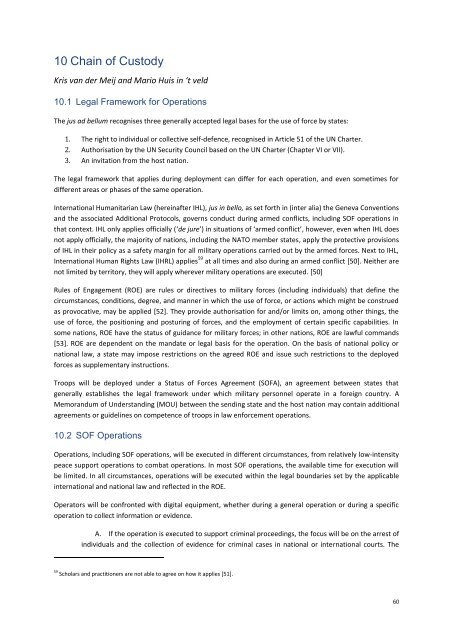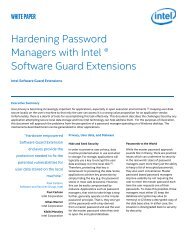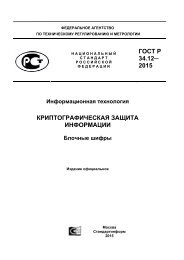BATTLEFIELD DIGITAL FORENSICS
BDF_Battlefield_Digital_Forensics_final
BDF_Battlefield_Digital_Forensics_final
You also want an ePaper? Increase the reach of your titles
YUMPU automatically turns print PDFs into web optimized ePapers that Google loves.
10 Chain of Custody<br />
Kris van der Meij and Mario Huis in ‘t veld<br />
10.1 Legal Framework for Operations<br />
The jus ad bellum recognises three generally accepted legal bases for the use of force by states:<br />
1. The right to individual or collective self-defence, recognised in Article 51 of the UN Charter.<br />
2. Authorisation by the UN Security Council based on the UN Charter (Chapter VI or VII).<br />
3. An invitation from the host nation.<br />
The legal framework that applies during deployment can differ for each operation, and even sometimes for<br />
different areas or phases of the same operation.<br />
International Humanitarian Law (hereinafter IHL), jus in bello, as set forth in (inter alia) the Geneva Conventions<br />
and the associated Additional Protocols, governs conduct during armed conflicts, including SOF operations in<br />
that context. IHL only applies officially (‘de jure’) in situations of ‘armed conflict’, however, even when IHL does<br />
not apply officially, the majority of nations, including the NATO member states, apply the protective provisions<br />
of IHL in their policy as a safety margin for all military operations carried out by the armed forces. Next to IHL,<br />
International Human Rights Law (IHRL) applies 59 at all times and also during an armed conflict [50]. Neither are<br />
not limited by territory, they will apply wherever military operations are executed. [50]<br />
Rules of Engagement (ROE) are rules or directives to military forces (including individuals) that define the<br />
circumstances, conditions, degree, and manner in which the use of force, or actions which might be construed<br />
as provocative, may be applied [52]. They provide authorisation for and/or limits on, among other things, the<br />
use of force, the positioning and posturing of forces, and the employment of certain specific capabilities. In<br />
some nations, ROE have the status of guidance for military forces; in other nations, ROE are lawful commands<br />
[53]. ROE are dependent on the mandate or legal basis for the operation. On the basis of national policy or<br />
national law, a state may impose restrictions on the agreed ROE and issue such restrictions to the deployed<br />
forces as supplementary instructions.<br />
Troops will be deployed under a Status of Forces Agreement (SOFA), an agreement between states that<br />
generally establishes the legal framework under which military personnel operate in a foreign country. A<br />
Memorandum of Understanding (MOU) between the sending state and the host nation may contain additional<br />
agreements or guidelines on competence of troops in law enforcement operations.<br />
10.2 SOF Operations<br />
Operations, including SOF operations, will be executed in different circumstances, from relatively low-intensity<br />
peace support operations to combat operations. In most SOF operations, the available time for execution will<br />
be limited. In all circumstances, operations will be executed within the legal boundaries set by the applicable<br />
international and national law and reflected in the ROE.<br />
Operators will be confronted with digital equipment, whether during a general operation or during a specific<br />
operation to collect information or evidence.<br />
A. If the operation is executed to support criminal proceedings, the focus will be on the arrest of<br />
individuals and the collection of evidence for criminal cases in national or international courts. The<br />
59 Scholars and practitioners are not able to agree on how it applies [51].<br />
60





